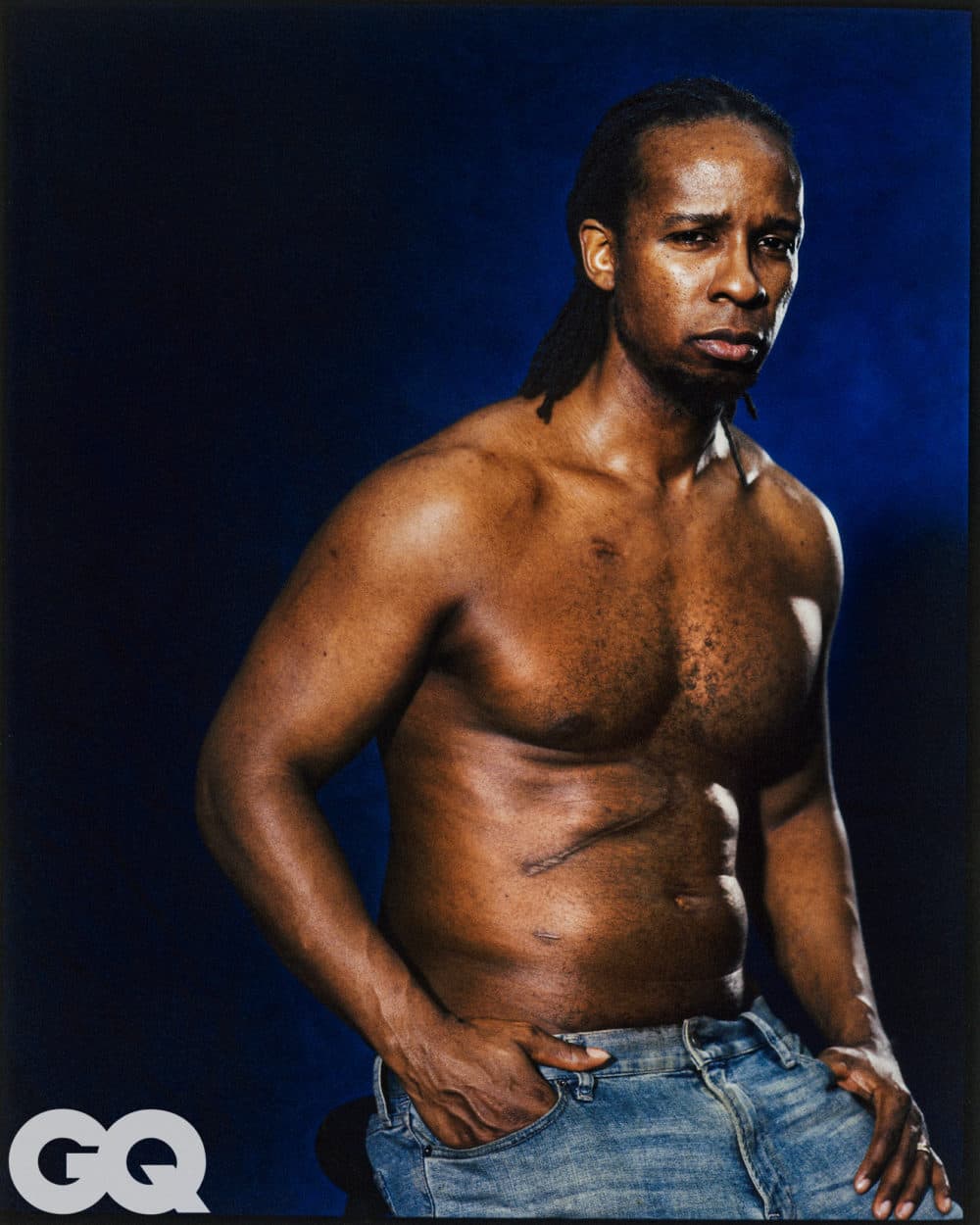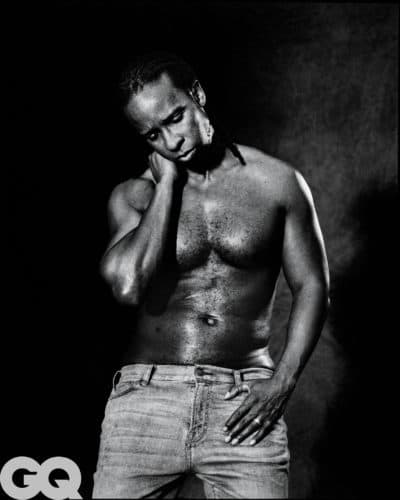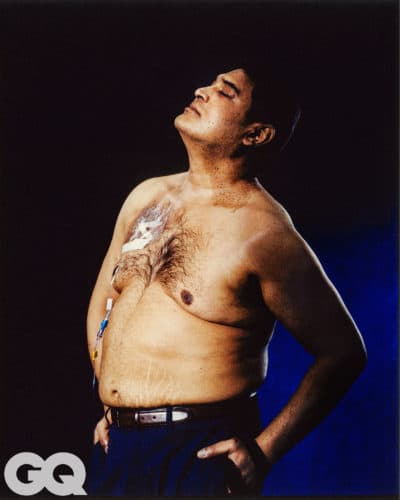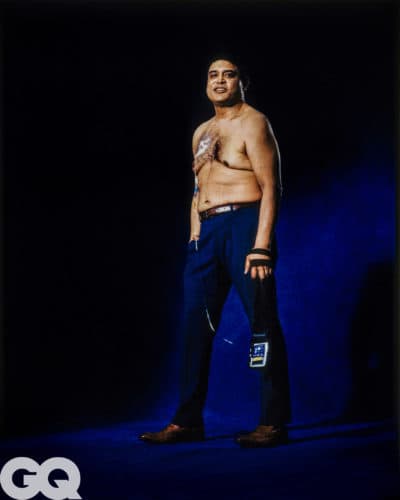Advertisement
Survivor's 'Guilt' To 'Courage': Ibram X. Kendi Among Advocates For Early Colon Cancer Screening

After actor Chadwick Boseman died last August at the age of 43 from colon cancer, the world learned about the startling rise of colorectal cancer rates.
This rise in cases is specifically among men under 45, the age when doctors recommend regular screening. Author and historian Ibram X. Kendi and marketing consultant Paul Rawate are among six cancer survivors featured in a new photographic essay in the May issue of GQ magazine called "Scar Stories: The Toll of Colon Cancer."
Rawate and Kendi's journeys started the same way: They both had symptoms but put off going to the doctor. When they finally did, colon cancer was the furthest thought in their minds. Neither were over 50 nor did they have a family history.
Now cancer-free, Kendi was diagnosed with stage 4 colon cancer when he was 35 years old. For him, the only risk factor was his race: Black Americans are 20% more likely to get colorectal cancer and about 40% more likely to die from it.

When Kendi first went to his medical provider, the 38-year-old Boston University professor recalls her asking about his age, medical history and family history.
“She stated that she did not think that this was anything necessarily serious — but it's important to rule out cancer,” he says.
Kendi says his reluctance to see a doctor left him feeling angry with himself for not getting checked out earlier. He prided himself on his healthy lifestyle, vegan diet and regular exercise routine before his diagnosis, but he neglected to seek help when he needed it.
“I've also been working through almost like a survivor's guilt because of my luck,” Kendi says. “But at the same time, I think that has transferred into almost like a survivor’s courage in which I'm trying to use my story to help others and to make some really drastic changes so we can really save lives.”
Rawate, who is Asian-American, says he spent close to nine months trying to get a referral for a colonoscopy to look at an “excruciating pain” in his lower side. He also had issues with sleep apnea due to weight gain caused by the blockage in his colon.
Advertisement
Now 45, Rawate is still undergoing treatment for stage 4 colorectal cancer. This July will mark three years of treatment.
When he got diagnosed, Rawate and his wife were preparing for their son to start school. His background in Taekwondo helped him handle his emotions following the news.

“It does take a toll on my wife and son,” the CEO of startup VITAL says, “because that's what I think the hardest part of this is: trying to be there for your family and watching them go through the fact that you might not be there in some amount of time.”
Kendi agrees that it’s difficult to watch people learn about his diagnosis. But it brought his family closer: Ever since Kendi came home from a major surgery covered in bandages, his now-5-year-old daughter has loved putting bandaids on herself.
Sharing this painful experience with loved ones gave Kendi the drive to fight for his life and health, he says. One thing that’s helped him on his journey is to focus on the immediate challenge ahead.
“An offensive lineman has to focus on that first block and then that next block in order to be successful,” he says. “You can't envision scoring a touchdown. You really have to sort of focus.”
Kendi says there were times he thought he was going to run out of options and lose the battle. But he made a key connection between his diagnosis and his work around racism.
“It's very difficult for many people to believe we could create a world without bigotry. And it's probably impossible,” he says. “But that doesn't mean we still shouldn't try to do the impossible.”
Without any other choice, Kendi decided to attempt the impossible.
“We don’t really have too many options,” Rawate adds. “Either we're going to fight it or we're going to give up, right?”
For Kendi, telling family and friends — both close and more distant — about the diagnosis posed a challenge. He decided to tell fewer people to avoid the awkwardness.

Rawate says he took advice from a friend who had breast cancer on telling people: Get a few “ambassadors” to spread the word. His father-in-law’s friends in Arizona said mass for him and his wife’s best friend blessed him in a Buddhist temple in Tibet.
But telling his close-knit groups of friends from high school and college proved to be more difficult.
“The hardest thing for people is when they look at me, you cannot tell that I really have stage 4 cancer,” Rawate says.
Rawate and Kendi are telling their stories to get the word out about screenings for colon cancer. But in reality, most people can't get this screening until age 45. Many people don't have insurance or doctors who are willing to give them the tests even if they ask for it.
“I just think you just can't take no for an answer,” Kendi says. “You should also be pushing for larger change within this community so that everyone is screened earlier, so that everyone has access to high-quality health care.”
For Rawate, he’s telling his story for people to recognize the signs of the disease and what to ask when seeking help. Then, he says people need to “do everything possible to make sure your mind, your body and your spirit are all strong enough to battle” the disease.
Ashley Locke produced and edited this interview for broadcast with Jill Ryan. Allison Hagan adapted it for the web.
This segment aired on May 13, 2021.

